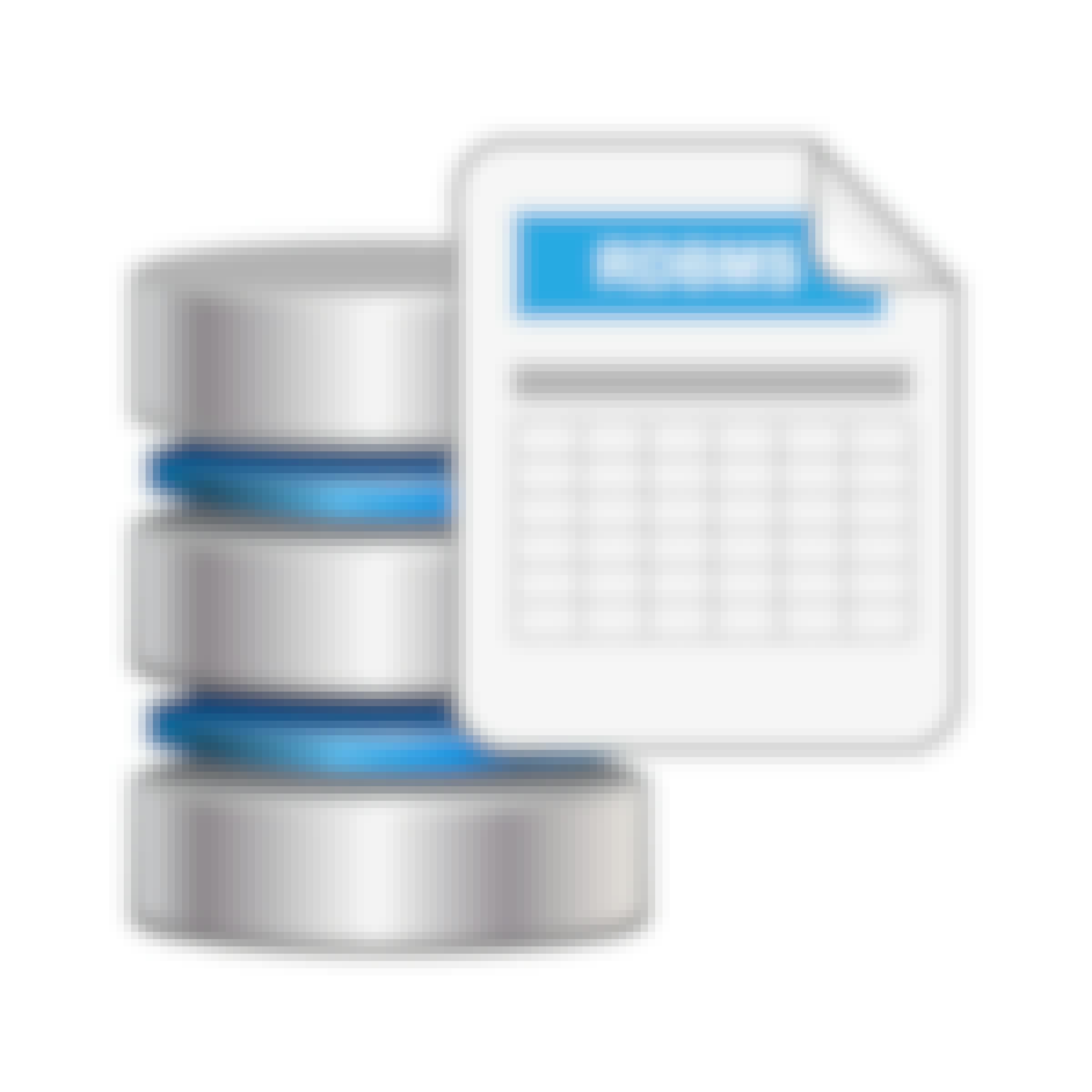- Browse
- Database Management
Database Management Courses
Database management courses can help you learn data modeling, SQL querying, database design, and normalization techniques. You can build skills in data integrity, performance tuning, and backup strategies to ensure efficient database operations. Many courses introduce tools like MySQL, PostgreSQL, and MongoDB, demonstrating how these technologies support data storage and retrieval while enhancing your ability to manage large datasets effectively.
Popular Database Management Courses and Certifications
 Status: Free TrialFree Trial
Status: Free TrialFree TrialSkills you'll gain: MySQL, Database Management, Stored Procedure, Database Design, Database Systems, Relational Databases, SQL, Database Development, Database Administration, Query Languages, Data Management, Data Integrity, Data Validation
4.8·Rating, 4.8 out of 5 stars556 reviewsBeginner · Course · 1 - 4 Weeks
 Status: Free TrialFree TrialU
Status: Free TrialFree TrialUUniversity of Colorado System
Skills you'll gain: Database Design, Relational Databases, Data Modeling, Database Management Systems, Database Management, Oracle Databases, SQL, Data Integrity, PostgreSQL, Conceptual Design
4.6·Rating, 4.6 out of 5 stars3.4K reviewsIntermediate · Course · 1 - 3 Months
 Status: FreeFreeC
Status: FreeFreeCClemson University
Skills you'll gain: Database Design, Database Management Systems, MySQL, Database Theory, Relational Databases, Databases, Data Modeling, Database Architecture and Administration, SQL, NoSQL, Diagram Design
Build toward a degree
4.5·Rating, 4.5 out of 5 stars39 reviewsIntermediate · Course · 1 - 3 Months
 Status: Free TrialFree Trial
Status: Free TrialFree TrialSkills you'll gain: MySQL, Database Management, Database Administration, Data Warehousing, Linux Commands, Data Integrity, Unit Testing, Algorithms, Software Versioning, Command-Line Interface, Software Visualization, Linux, Pseudocode, Query Languages, Collaborative Software, Django (Web Framework), Database Architecture and Administration, Programming Principles, Computational Thinking, Test Driven Development (TDD)
4.6·Rating, 4.6 out of 5 stars7.6K reviewsBeginner · Professional Certificate · 3 - 6 Months
 Status: Free TrialFree Trial
Status: Free TrialFree TrialSkills you'll gain: Data Storytelling, Dashboard, Data Warehousing, Database Design, SQL, Data Presentation, Data Visualization, Interactive Data Visualization, Data Security, Data Migration, Data Governance, Descriptive Statistics, Data Store, Data Management, Relational Databases, Databases, Exploratory Data Analysis, Data Architecture, Excel Formulas, Business Intelligence
4.7·Rating, 4.7 out of 5 stars18K reviewsBeginner · Professional Certificate · 3 - 6 Months
 Status: Free TrialFree Trial
Status: Free TrialFree TrialSkills you'll gain: Database Design, Database Management Systems, SQL, Relational Databases, Databases, MySQL, Database Administration, Data Integrity, Query Languages, Data Manipulation
4.7·Rating, 4.7 out of 5 stars1.4K reviewsBeginner · Course · 1 - 3 Months
What brings you to Coursera today?
 Status: Free TrialFree Trial
Status: Free TrialFree TrialSkills you'll gain: Database Design, IBM DB2, Relational Databases, Databases, MySQL, Database Architecture and Administration, PostgreSQL, Database Management Systems, Data Management, SQL, Data Modeling, Data Manipulation, Data Import/Export, Data Integrity, Data Security, Command-Line Interface
4.6·Rating, 4.6 out of 5 stars771 reviewsBeginner · Course · 1 - 4 Weeks
 Status: Free TrialFree Trial
Status: Free TrialFree TrialSkills you'll gain: Database Administration, Relational Databases, Database Management, Database Architecture and Administration, MySQL, Database Systems, IBM DB2, Operational Databases, PostgreSQL, Stored Procedure, Data Storage Technologies, Disaster Recovery, Role-Based Access Control (RBAC), Performance Tuning, Authentications, User Accounts
4.5·Rating, 4.5 out of 5 stars258 reviewsIntermediate · Course · 1 - 3 Months
 Status: Free TrialFree Trial
Status: Free TrialFree TrialSkills you'll gain: Oracle Databases, Database Administration, Relational Databases, Database Management Systems, Database Architecture and Administration, Data Import/Export, Patch Management, Database Systems, Operational Databases, Multi-Tenant Cloud Environments, Data Migration, Database Management, Data Storage Technologies, Software Installation, Performance Tuning, User Accounts, System Configuration, SQL, Virtual Environment, Disaster Recovery
4.6·Rating, 4.6 out of 5 stars10 reviewsIntermediate · Specialization · 3 - 6 Months
 Status: Free TrialFree Trial
Status: Free TrialFree TrialSkills you'll gain: SQL, Database Management, MySQL, Relational Databases, Query Languages, Databases, Database Application, Database Design, Data Access, Java, Java Programming, UI Components, User Interface (UI), Software Development
4.3·Rating, 4.3 out of 5 stars35 reviewsBeginner · Course · 1 - 4 Weeks
 Status: NewNewStatus: Free TrialFree TrialM
Status: NewNewStatus: Free TrialFree TrialMMicrosoft
Skills you'll gain: Data Pipelines, Databases, Extract, Transform, Load, Data Lakes, NoSQL, SQL Server Integration Services (SSIS), Data Processing, Data Architecture, Azure Synapse Analytics, Data Warehousing, Data Management, Microsoft Azure, Data Transformation, Database Management Systems, Data Infrastructure, Data Integration, Data Governance, Data Storage Technologies, Data Storage, Real Time Data
Intermediate · Course · 1 - 3 Months
 Status: Free TrialFree Trial
Status: Free TrialFree TrialSkills you'll gain: Data Management, Data Collection, Data Governance, Data Analysis, Information Privacy, Data Quality, Data Storage, Data Security, Data-Driven Decision-Making, Data Architecture, Data Visualization Software, Big Data, Machine Learning
4.8·Rating, 4.8 out of 5 stars115 reviewsBeginner · Course · 1 - 4 Weeks
What brings you to Coursera today?
In summary, here are 10 of our most popular database management courses
- Database Structures and Management with MySQL: Meta
- Database Management Essentials: University of Colorado System
- Database Management Systems: Clemson University
- Meta Database Engineer: Meta
- IBM Data Management: IBM
- Introduction to Databases: Meta
- Introduction to Relational Databases (RDBMS): IBM
- Relational Database Administration (DBA): IBM
- Oracle Database Administration from Zero to Hero: Packt
- Database Management with Java and SQL: Amazon
Frequently Asked Questions about Database Management
Database management refers to the processes and technologies used to store, retrieve, and manipulate data in databases. It is crucial because effective database management ensures data integrity, security, and accessibility, which are essential for informed decision-making in any organization. As businesses increasingly rely on data for strategic planning and operational efficiency, understanding database management becomes vital for anyone looking to thrive in today's data-driven environment.
A variety of job roles are available in the field of database management. These include Database Administrator, Data Analyst, Data Engineer, and Database Developer. Each role focuses on different aspects of database management, from maintaining database systems to analyzing data for insights. With the growing importance of data in business, opportunities in this field are expanding, making it a promising career choice.
To succeed in database management, you should develop a mix of technical and analytical skills. Key skills include proficiency in SQL, understanding database design principles, knowledge of data modeling, and familiarity with database management systems like MySQL, Oracle, or Microsoft SQL Server. Additionally, skills in data analysis and problem-solving are essential for interpreting data and making informed decisions.
There are several excellent online courses available for learning database management. For instance, Database Management Essentials provides foundational knowledge, while Database Management Systems offers a deeper dive into system functionalities. Other notable options include Data Management and Database Design Part 1 and Data Management and Database Design Part 2, which cover essential design principles.
Yes. You can start learning database management on Coursera for free in two ways:
- Preview the first module of many database management courses at no cost. This includes video lessons, readings, graded assignments, and Coursera Coach (where available).
- Start a 7-day free trial for Specializations or Coursera Plus. This gives you full access to all course content across eligible programs within the timeframe of your trial.
If you want to keep learning, earn a certificate in database management, or unlock full course access after the preview or trial, you can upgrade or apply for financial aid.
Learning database management can be approached through a combination of online courses, hands-on practice, and real-world projects. Start by enrolling in introductory courses to build your foundational knowledge. Then, practice by working on sample databases or contributing to open-source projects. Engaging with community forums and seeking mentorship can also enhance your learning experience.
Typical topics covered in database management courses include database design, SQL programming, data modeling, normalization, and database security. Advanced courses may also explore data integration, performance tuning, and the use of specific database management systems. These topics equip learners with the skills needed to effectively manage and utilize databases in various contexts.
For training and upskilling employees in database management, courses like IBM Data Management Professional Certificate and Database Integration and Management are highly recommended. These programs provide comprehensive training that can enhance the skills of the workforce, ensuring they are equipped to handle modern data challenges.










